#minibus in paris
Text
8rental minibus

If you're planning a trip to Paris with a group of friends or family, you may be wondering about the best way to get around the city. Public transportation can be crowded and inconvenient, and taxis can be expensive. That's where 8rental comes in. This company provides minibus rental services in Paris, making it easy for you to explore the city and its surroundings.
One of the biggest advantages of renting a minibus with 8rental is the flexibility it offers. You can create your own itinerary and visit the places that interest you most. Whether you want to spend the day at Disneyland Paris or take a wine-tasting tour in the Champagne region, 8rental minibus can accommodate your needs. You can travel at your own pace and enjoy the trip without feeling rushed.

Another advantage of renting a minibus with 8rental is the comfort it provides. The minibuses are modern and well-maintained, with comfortable seats and air conditioning. This means that you can relax and enjoy the journey without worrying about getting hot or uncomfortable. The minibuses also have plenty of space for luggage, so you don't have to worry about cramming everything into a small car.
One thing that sets 8rental apart from other minibus rental companies is their focus on safety. All of their drivers are experienced and qualified, and the vehicles are regularly inspected and maintained. This means that you can feel confident that you and your group will arrive at your destination safely.
Booking a minibus with 8rental is easy and convenient. You can visit their website and choose the minibus that best suits your needs, then make a reservation online. The customer service team is available 24/7 to answer any questions or concerns you may have.
If you're worried about the cost of renting a minibus, you may be surprised at how affordable it can be. When you consider the cost of public transportation or taxis for a group, renting a minibus can actually be a cost-effective option. Plus, you get the added convenience and comfort of traveling together in one vehicle.

Finally, renting a minibus with 8rental can make your trip to Paris more enjoyable and stress-free. You don't have to worry about navigating public transportation or dealing with the hassle of taxis. Instead, you can sit back and relax while your driver takes care of everything. This allows you to focus on enjoying your trip and making memories with your friends and family.
In conclusion, renting a minibus with 8rental is a great option for anyone traveling to Paris with a group. The flexibility, comfort, safety, and affordability make it an attractive option for both tourists and locals. Whether you want to explore the city or venture out into the countryside, 8rental minibus can provide the perfect solution. So why not consider renting a minibus for your next trip to Paris? You won't regret it!
0 notes
Text
Last week, Doctors Without Borders announced that it had to close its operations in Russia after the Justice Ministry removed its affiliate office from the country’s foreign NGO register. Also known as Médecins Sans Frontières (MSF), this international non-governmental organization was among the first humanitarian missions to start working in Russia after the Soviet Union’s collapse. For more than three decades, MSF implemented dozens of important programs, helping vulnerable people across Russia through difficult situations. Since 2022, Doctors Without Borders has also offered humanitarian aid to civilians affected by the Russo-Ukrainian War. The Russian Justice Ministry didn’t offer an explanation for the decision, which made it impossible for MSF to continue working in the country. To mark the departure of Doctors Without Borders from Russia, Meduza looks back on their 32 years of work.
From Moscow to Chechnya
Founded in Paris by a group of doctors and journalists in 1971, Médecins Sans Frontières (Doctors Without Borders, in English) now operates in 70 countries, providing medical assistance to people in emergency situations and those excluded from health care. The organization relies on donations from companies, private foundations, and individual donors. In 2023, MSF raised 2.37 billion euros ($2.64 billion) to support its work, most of which came from some 7.3 million private donors.
Doctors Without Borders began working in Russia in 1992, distributing free food to children under three years old at “milk kitchens” in Moscow. Later that year, MSF began assisting the Russian capital’s homeless population, which numbered around 30,000 people — all of whom lacked access to medical and social services.
In an interview with Moskvich Mag, Dr. Alexey Nikiforov, who later became the deputy medical coordinator of the MSF mission in Russia and Belarus, recalled the organization’s work in Moscow in those early days:
We agreed to supply some hospitals with, say, dressings and to buy additional medications, and in return they would admit the homeless persons we would send to them from our first-aid post. In the morning, we [treated] patients with urgent problems at the first-aid post, and if some homeless person needed hospitalization, then we’d make arrangements with a hospital. And in the afternoon we’d transport patients to the hospitals in our minibus.
MSF doctors also used their minibus to make regular visits to train stations and other places in Moscow where homeless people sheltered, to provide them with emergency medical consultations. The organization also worked closely with city officials to improve municipal services for the homeless population, such as shelters.
In addition, MSF worked to raise awareness about the problems unhoused people faced, running an ad campaign in the Moscow subway system and parking a bus outside the mayor’s office emblazoned with a running tally of the deaths from hypothermia on the city’s streets. As Nikiforov recalled:
[W]ith the help of our advertiser friends, we made a poster with a stylized snowman lying in a snowdrift; on the poster there were cutouts and you could change the numbers to how many people had frozen to death in Moscow since the start of the winter and overnight. We attached the poster [to the bus] and updated the data in the windows every day.
Battling tuberculosis
In 1995, Doctors Without Borders began tackling the spread of tuberculosis in Russian prisons. The initiative began at the Mariinsky penal colony in the Kemerovo region, after the prison hospital’s chief physician, Natalya Vezhnina, “paid her way to some international conference in Europe, where she announced that she was tired of burying her prisoners — they die every day,” Alexey Nikiforov told Moskvich magazine.
With permission from the Federal Penitentiary Service, MSF aid workers were allowed to visit the Mariinsky prison hospital, and thus began their treatment program for drug-sensitive tuberculosis in the Russian penitentiary system. “The necessary first-line drugs cost pennies now, but back then there were problems with medical supplies,” Nikiforov recalled.
In addition to distributing medicine, MSF organized a system for screening new prisoners, established diagnostic procedures, and managed to provide uninterrupted, months-long treatment for prisoners with TB. Its work soon extended to other prison facilities in the Kemerovo region, as well as to tuberculosis hospitals, where medical staff were taught how to administer more effective treatment, thereby preventing the spread of TB.
In 2004, Doctors Without Borders launched a tuberculosis treatment program in Chechnya. As Nikiforov said in interviews, the two wars in Chechnya had destroyed nearly all of the infrastructure needed to treat tuberculosis patients, leaving the entire region without a dedicated TB hospital and with just 12 tuberculosis specialists. In particular, MSF’s work consisted of distributing medications that weren’t available in the region at all. According to Nikiforov, the organization ultimately treated more than 5,500 tuberculosis patients in Chechnya.
MSF wound down its projects in Chechnya in 2017, handing over tuberculosis treatment to the Chechen Health Ministry. But the organization continued to launch shorter tuberculosis treatment programs in other parts of Russia, including in the Arkhangelsk and Ivanovo regions, most recently.
Russia’s wars
In 1999, Doctors Without Borders won the Nobel Peace Prize, “in recognition of the organization's pioneering humanitarian work on several continents.” In his Nobel speech, then-president of the MSF International Council, Dr. James Orbinsk, made an appeal to President Boris Yeltsin condemning Russia’s violence against civilians in Chechnya:
The people of Chechnya — and the people of Grozny — today and for more than three months, are enduring indiscriminate bombing by the Russian army. For them humanitarian assistance is virtually unknown. It is the sick, the old and the infirm who cannot escape Grozny. [...] I appeal here today to his excellency the Ambassador of Russia and through him, to President Yeltsin, to stop the bombing of defenseless civilians in Chechnya. If conflicts and wars are an affair of the state, violations of humanitarian law, war crimes, and crimes against humanity apply to all of us.
[...]
Silence has long been confused with neutrality, and has been presented as a necessary condition for humanitarian action. From its beginning, MSF was created in opposition to this assumption. We are not sure that words can always save lives, but we know that silence can certainly kill.
Doctors Without Borders worked on the ground in Chechnya, Ingushetia, and Dagestan, performing consultations for residents and displaced persons, supplying hospitals and clinics with essential medicines, and providing psychological and medical assistance.
In 2001, armed individuals kidnapped the head of the Doctors Without Borders North Caucasus mission, U.S. citizen Kenneth Gluck, holding him hostage for a month. Armed men then abducted the MSF head of mission for Dagestan, Dutch national Arjan Erkel, in 2002. The organization suspended its operations in the Russian North Caucasus following Erkel’s kidnapping. He was finally released in 2004.
Following Russia’s full-scale invasion of Ukraine in 2022, Doctors Without Borders began providing humanitarian aid to Ukrainian refugees in Russia, as well as to displaced Russians (in addition to its extensive operations in Ukraine). “Since the start of our response in 2022, more than 52,000 refugees and displaced people were provided with humanitarian aid and more than 15,400 received free medical, mental health, and psychosocial support,” the organization said in a September press release.
Since October 2022, Doctors Without Borders had worked in Russia’s Belgorod region alongside the non-profit organization Path to the Future (Put’ v budushchee, in Russian). MSF also planned to provide humanitarian assistance in the Kursk region, but was ultimately forced to shutter its operations.
In the press release announcing the closure of its programs, MSF said it “would like to work in Russia again should the necessary conditions be provided by authorities.”
“We are very sad to conclude our programmes in the country as many people in need of medical and humanitarian assistance will now be left without the support we could have provided to them,” said Norman Sitali, the MSF operations manager responsible for programs in Russia. “MSF would like to still work in Russia again, if and when possible.”
2 notes
·
View notes
Text
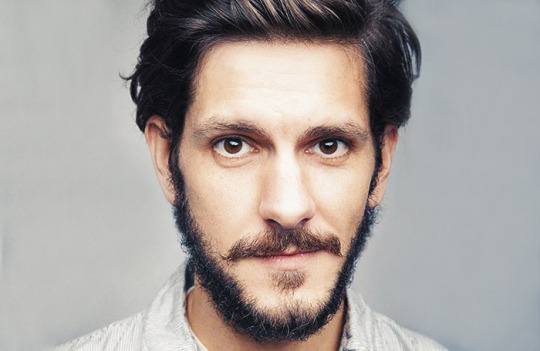
Mathew Baynton: ‘I’ve never done any Shakespeare – although I’ve played the man himself’
Best known as part of the troupe behind hit TV series Horrible Histories and Ghosts, Mathew Baynton tells Fergus Morgan about returning to the stage – in the RSC’s A Midsummer Night’s Dream – and how his Bottom will be sweet and sincere
Actor and writer Mathew Baynton will be familiar to most from his screen roles – as Deano in Gavin and Stacey, Simon in Peep Show and as lovelorn 19th-century poet Thomas Thorne in BBC One’s much-loved and recently concluded sitcom Ghosts. In fact, television has taken up most of Baynton’s time lately. When he steps on stage as Bottom in the Royal Shakespeare Company’s new production of A Midsummer Night’s Dream later this month, it will be his first theatrical role in more than a decade.
“I never made a conscious decision to do less theatre,” Baynton says. “There has been stuff that never worked out, some near misses that didn’t happen and it ended up being 10 years. I love Shakespeare but I’ve never had the chance to do any, although I’ve played the man himself a couple of times. I have had that Uncle Monty realisation from Withnail and I that I will never play Romeo or Hamlet, but there are loads of great Shakespeare roles that I want to do, such as this one.”
Born in 1980, Baynton grew up in Southend-on-Sea. He was “comedy obsessed” as a child – “I used to have everything from Blackadder to French and Saunders on VHS,” he remembers – then became interested in the physical theatre comedy of troupes such as Peepolykus and Spymonkey. He completed a degree in directing at Rose Bruford College, then travelled to Paris to train at the prestigious Ecole Philippe Gaulier school.
In 2009, he collaborated with five other comedians – Simon Farnaby, Martha Howe-Douglas, Jim Howick, Laurence Rickard and Ben Willbond – on the CBBC sketch show Horrible Histories. The six of them subsequently formed the collective Them There, and went on to create the series Yonderland and Ghosts. Baynton also co-wrote the 2013 comedy The Wrong Mans with James Corden, and stars in recent blockbuster Wonka as a conniving chocolatier. He lives in London with his wife and children.
“Every influence I’ve ever had is in there somewhere,” Baynton says, when asked about his approach to comedy. “In some ways, though, the older I get, the more I think that being funny is almost innate. It feels like a rarer quality than any other. It is hard to teach someone who has no funny bones to be funny. Ultimately, I just like collaborating in a room with like-minded people, trying to make stuff funnier and better. It feels natural to me. It feels not dissimilar to playing in a band.”
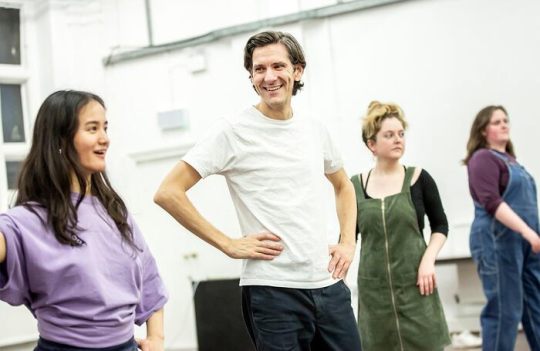
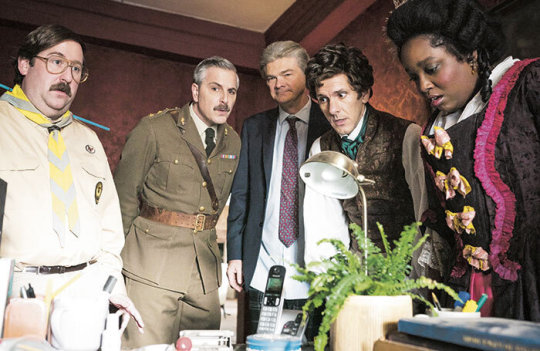
What production made you fall in love with theatre?
I had a wonderful theatre studies teacher called Mr Valencia, who borrowed the school minibus and drove us into London to see shows. He took us to some absolute crackers. One that stands out in particular is Complicité’s The Street of Crocodiles. That blew my mind.
What are you finding inspiring at the moment?
I’m an avid consumer of all kinds of art. I like discovering new things. I don’t get to the theatre as much as I’d like to, though. The most amazing show I saw recently was Accidental Death of an Anarchist starring Daniel Rigby and written by Tom Basden. That was completely inspiring.
What do you wish you could change about the performing arts industry?
Firstly, tickets are way too expensive. Secondly, access to our industries is really difficult. We lose an awful lot of voices that would enrich our industry because they can’t afford a career in the arts.
What is the worst thing that has happened to you on stage?
I can’t think of anything off the top of my head. On television, you can corpse and do another take. On stage, there is that hot panic when you realise you can’t hold on. I don’t think it will matter too much if that happens in A Midsummer Night’s Dream. It would be different if I was playing Macbeth.
What is the best thing that has happened to you on stage?
I’m lucky that I have been able to work with some of my heroes. To pick a recent example, on the first day of shooting for Wonka, I was in a green room at St Paul’s Cathedral with Rowan Atkinson. I was sat there with Blackadder. That was a pinch-me moment.
What role do you really want to play?
There are loads. I’m hungry to do lots of stuff, not just comedy. I’d love to play Malvolio one day. I was asked this question on the red carpet for Wonka, and I said that I would love to play Jack Skellington if they ever did a stage adaptation of the Tim Burton film The Nightmare Before Christmas.
What projects are you involved in at the moment?
I’m playing Bottom with the Royal Shakespeare Company until the end of March. My Bottom does have some similarities to Thomas in Ghosts. I look a lot like him, I suppose, and I’m playing him with sincerity, too. Bottom is just really, really keen on putting on a show and there is something sweet and interesting about that.
A Midsummer Night’s Dream is at the Royal Shakespeare Theatre, Stratford-upon-Avon from January 30 to March 30: rsc.org.uk
#mathew baynton#mat baynton#the stage#a midsummer night's dream#a midsummer nights dream#amnd#another lovely read#plus a new photo!! will have to check out their social media & a possible website for hopefully more#rj: interview#rj: mathew baynton#rj: the stage#rj: a midsummer night's dream#rj: 2024
5 notes
·
View notes
Text
Paris is the town
Zecira Musovic
Then the Champions League started again and first on the schedule are beautiful Paris and tough PSG. Often these matches are placed late in the evening, which means a lot of hours to spend on match day and the longing to kick off quickly becomes palpable.

How do we make the hours tick? Some sleep away many hours, others take the minibus to some coffee. We Scandinavians love to walk, so we usually walk to our destination, even if it means 784 meters further than most of the team can manage to walk. Once there, we fill up the coffee, rearrange the furniture and become a direct distraction to the other customers who just want to drink their cappuccino in peace and quiet. Come on, we're having a good time and the time is actually passing.
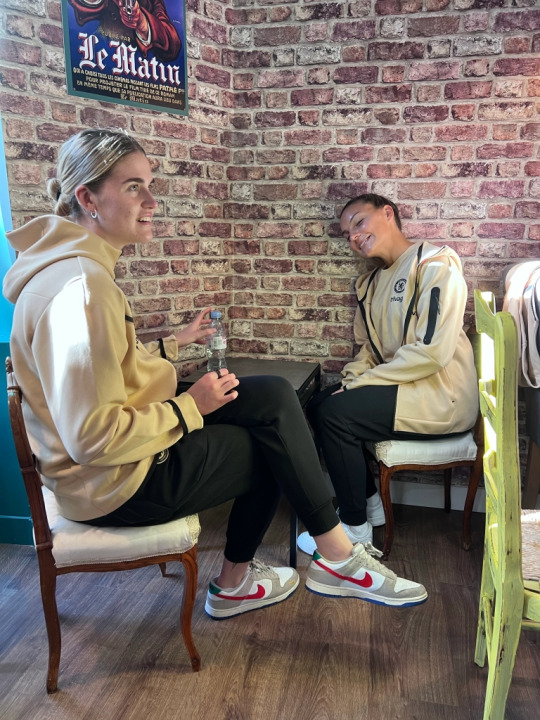
#zecira musovic#article#jessie naomi and emily included in the 'we scandinavians' is music to my ears
35 notes
·
View notes
Note
Z just produced a new piece. It shouldn't be so funny with the preferred walking. We already know the Scandis are a special breed 😆
Then the Champions League started again and first on the schedule are beautiful Paris and tough PSG. Often these matches are placed late in the evening, which means a lot of hours to spend on match day and the longing to kick off quickly becomes palpable.
How do we make the hours tick? Some sleep away many hours, others take the minibus to some coffee. We Scandinavians love to walk, so we usually walk to our destination, even if it means 784 meters further than most of the team can manage to walk. Once there, we fill up the cafe, rearrange the furniture and become a direct distraction to the other customers who just want to drink their cappuccino in peace and quiet. Come on, we're having a good time and the time is actually passing.


14 notes
·
View notes
Photo

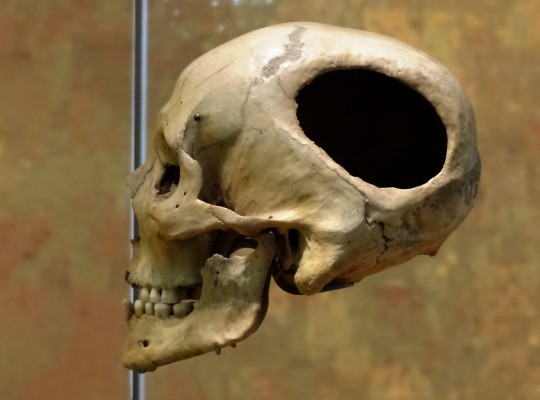

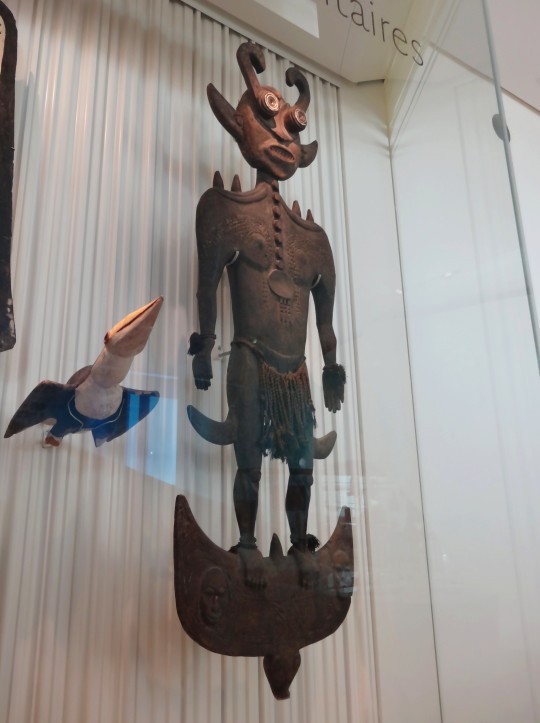
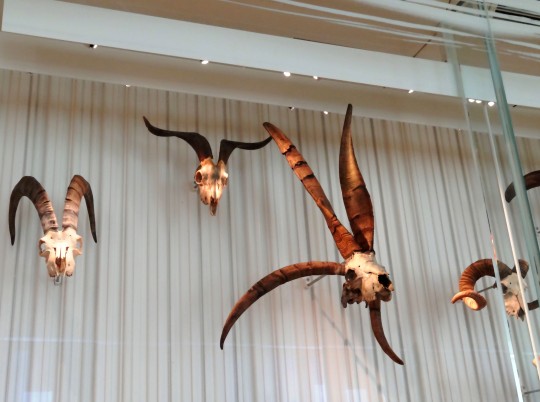

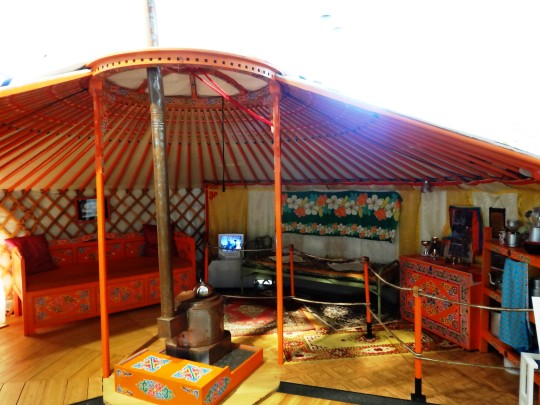
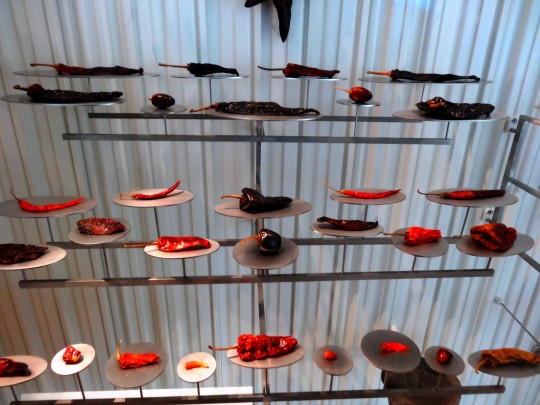
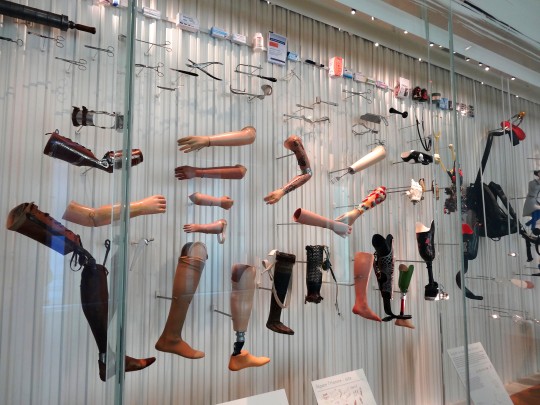
Je reviens à mon projet de présenter la plupart de mes 55000 photos (nouveau compte approximatif. On se rapproche du présent !).
2016. Une journée à Paris. Le Musée de l’Homme:
- Saint Ambroise, ruche - Pays-Bas
- crâne trépané de gaulois bellovaque - Oise, environ -1000av.J-C.
- statuette, Ugarit
- démon chrétien - Papouasie
Pour le reste : variété de chèvres élevées et de piments cultivés, yourte, minibus africain et prothèses...
#souvenirs#paris#musée de l'homme#archéologie#celte#bellovaque#gaulois#trépanation#saint ambroise#ruche#ruche en osier#ugarit#démon#diable#monstre#papouasie#chèvre#piment#cultivar#race#yourte#minibus#prothèse#jambe de bois
2 notes
·
View notes
Text
Booking Airport Transfer Services Can Prove Helpful
You just reached a foreign destination for your vacation. The first thing you need is a reliable airport transfer service. They offer pickup and drop services to and from the airport. You can select your ride as per your requirements and convenience.
You can search for Paris Airport to Disneyland transfer services online
These services offer more convenience when used
You can book the transfer service even as you reach the destination airport
Convenience
You have to keep in mind that airport transfers are always more convenient. You can simply book an airport transfer at any time.

When you book the service, you can rent any vehicle you like. You can also book a minibus service if you are travelling in your group. You can book transfer Paris to Disney service from your mobile device.
Saves your time
Imagine if you have to wait for a cab at the hotel to reach the airport terminal. There are chances that you may have to miss your flight if the cab is late. This is not the case with airport transfer services.
You can book Paris airport to Disneyland service and reach the airport on time. The ride will arrive on time so you never get late. You can also book the service if you arrive at the airport.
Professionalism
You can rent airport transfer services that are very professional. The ride is operated by an expert team. They plan to complete travel on time.
You can select airport transfer Paris to Disney service and hire a chauffeur to ride you to the airport. This looks very stylish and professional.
You also get to travel in comfort when you book the best ride. You just have to make your choice to select the right ride. The services are also reliable and will help you reach on time.
Paris Airport to Disneyland
transfer Paris to Disney
0 notes
Text
"Melvyn rentre à la maison (dans le Var) avec moi et le dimanche soir, on reçoit un coup de fil de Louis Carbonnel (ndlr : le demi d’ouverture du RCT et ami de longue du Perpignanais) qui lui dit : « Melvyn, on part dans une heure.Prépare vite ta valise, on te récupère avec le minibus qui nous amène à l’aéroport pour rejoindre Paris et Marcoussis. »" je hurle louis et melvyn <3333
0 notes
Text
Events 1.5 (after 1950)
1953 – The play Waiting for Godot by Samuel Beckett receives its première in Paris.
1957 – In a speech given to the United States Congress, United States President Dwight D. Eisenhower announces the establishment of what will later be called the Eisenhower Doctrine.
1967 – Cultural Revolution: The Shanghai People's Commune is established following the seizure of power from local city officials by revolutionaries.
1968 – Alexander Dubček comes to power in Czechoslovakia, effectively beginning the "Prague Spring".
1969 – The Venera 5 space probe is launched at 06:28:08 UTC[24] from Baikonur.
1969 – Ariana Afghan Airlines Flight 701 crashes in Fernhill, West Sussex, while on approach to Gatwick Airport, killing 50 people.
1970 – The 7.1 Mw Tonghai earthquake shakes Tonghai County, Yunnan province, China, with a maximum Mercalli intensity of X (Extreme). Between 10,000 and 15,000 people are known to have been killed and about another 26,000 are injured.
1972 – US President Richard Nixon announces the Space Shuttle program.
1975 – The Tasman Bridge in Tasmania, Australia, is struck by the bulk ore carrier Lake Illawarra, killing twelve people.
1976 – The Khmer Rouge announce that the new Constitution of Democratic Kampuchea is ratified.
1976 – The Troubles: Gunmen shoot dead ten Protestant civilians after stopping their minibus at Kingsmill in County Armagh, Northern Ireland, UK, allegedly as retaliation for a string of attacks on Catholic civilians in the area by Loyalists, particularly the killing of six Catholics the night before.
1991 – Georgian forces enter Tskhinvali, the capital of South Ossetia, Georgia, opening the 1991–92 South Ossetia War.
1991 – Somali Civil War: The United States Embassy to Somalia in Mogadishu is evacuated by helicopter airlift days after the outbreak of violence in Mogadishu.
1993 – The oil tanker MV Braer runs aground on the coast of the Shetland Islands, spilling 84,700 tons of crude oil.
2005 – The dwarf planet Eris is discovered by Palomar Observatory-based astronomers, later motivating the International Astronomical Union (IAU) to define the term planet for the first time.
2014 – A launch of the communication satellite GSAT-14 aboard the GSLV MK.II D5 marks the first successful flight of an Indian cryogenic engine.
2022 – Kazakh President Kassym-Jomart Tokayev dismisses Prime Minister Asqar Mamin and declares state of emergency over the 2022 Kazakh unrest.
0 notes
Text
Pompeii
Our third day in Rome wasn't actually in Rome. We took a guided tour a few hours south to see Pompeii and the Amalfi coast.
Our tour guide this time was a young American ex-pat who has lived in Rome for six years. Her name was Paris and I'm sure it's extremely annoying to be an American named Paris living in Rome because people probably make jokes about it constantly. She piled our group of 18 onto a minibus driven by a man named Antonio, and proceeded to regale us with facts about Italy for a solid 60 percent of the 3-hour trip to Pompeii. It was impressive. Also, apparently living in Italy for six years is enough to change your accent, because she sounded like the Italian version of when your attention-seeking cousin comes back from a trip to England with a fake British accent.
In Pompeii, she delivered us into the hands of Vincenzo, an archaeologist (allegedly? I don't know his credentials) who guided us through Pompeii. It was extremely hot and very crowded, but it was interesting to see the ruins.
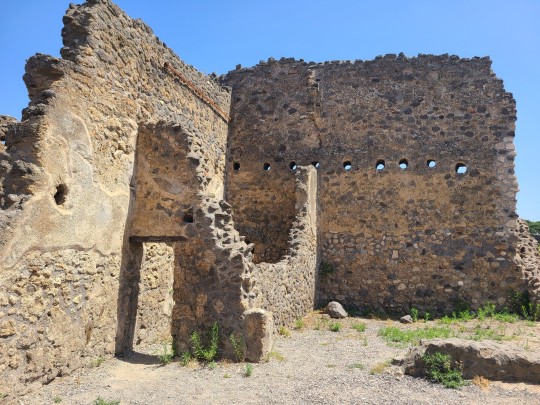
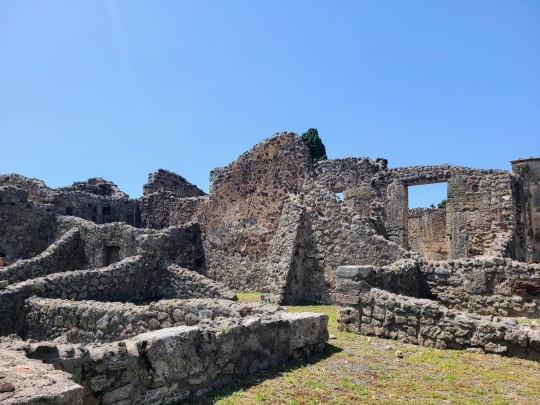
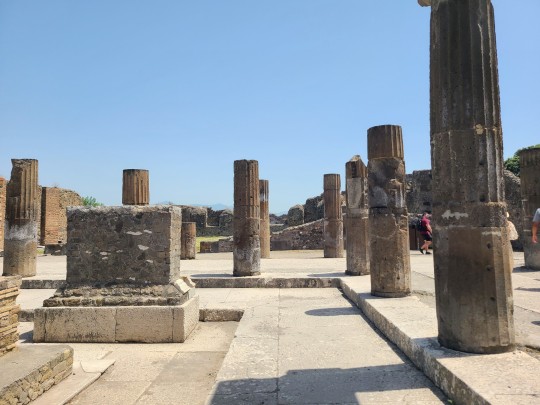
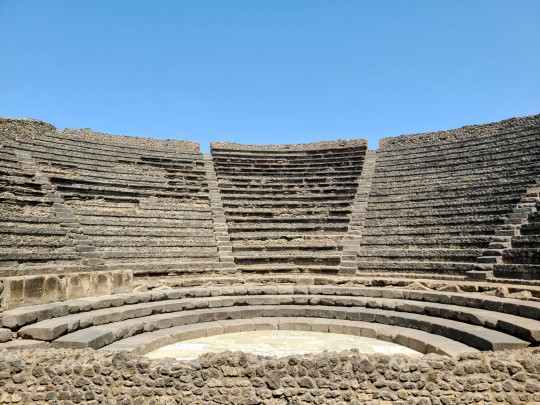
Some of the interior decorations managed to survive Vesuvius, although the colors have long since faded.

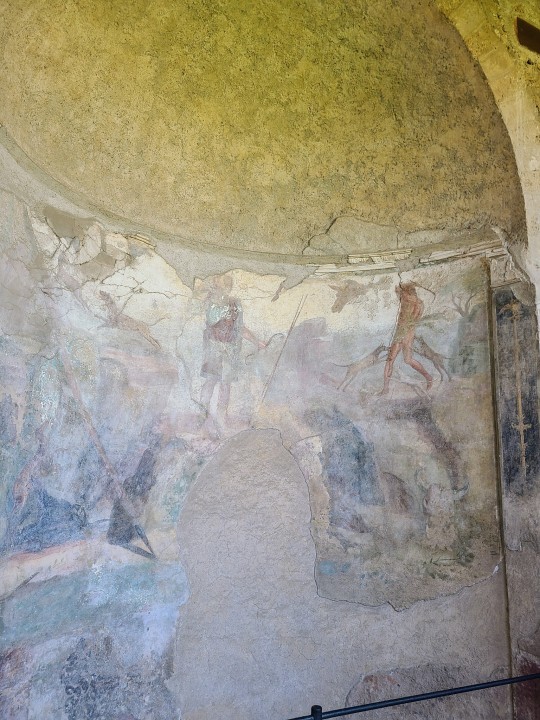
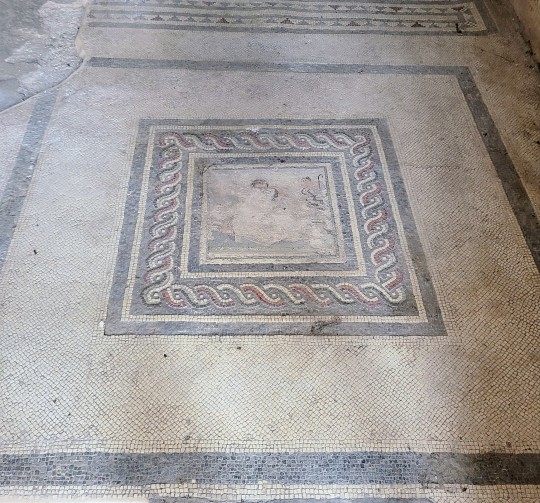
This Roman bath was particularly well-preserved, or perhaps well-restored.
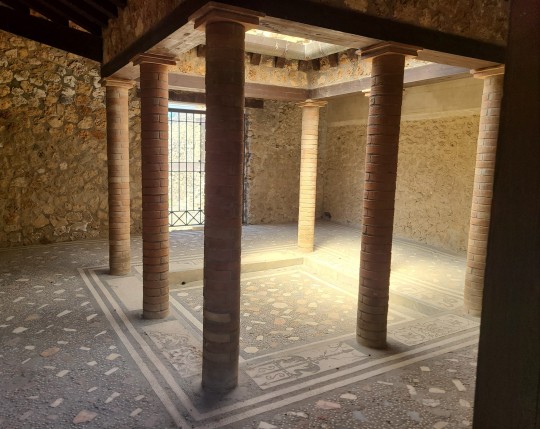
And archaeologists studied the root prints in the ash to figure out exactly what kind of plants used to grow in this courtyard so that they could plant them again.
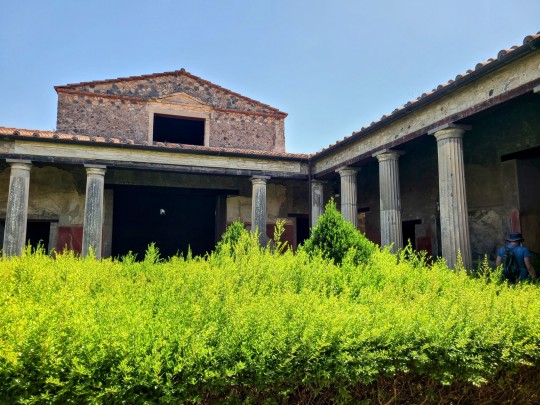
Vincenzo was especially excited to show us this ancient fast food restaurant, where a proprietor served food from these clay pots embedded in the table.
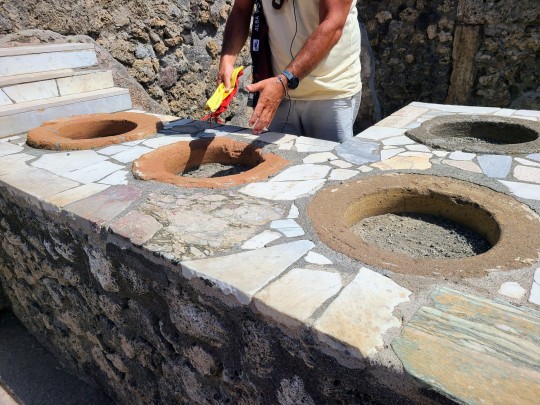
Vincenzo was also very excited to show us all the phalluses and tell us about the importance of phalluses to ancient Roman culture and show us the little phallus amulet he wore around his neck. (This went a long way to explaining why I've seen so many penis-shaped souvenirs in the past few days.) We went into the ancient brothel, which had paintings on the wall that served as a menu for patrons.
We finished by walking through the small museum. When Pompeii was covered in ash, the ash compacted around the bodies of people, so when the bodies decomposed, they left behind voids in their precise shapes (as well as their skeletons). Archaeologists were able to use these voids as, essentially, molds, pouring plaster in to create casts in the shapes of the bodies (that would then contain the skeletons). It was really affecting to see these people frozen in time, cowering, some of them sheltering children's bodies. Vincenzo, unsurprisingly, was sure to call our attention to the cast of a man with an erection. Imagine dying in a shower of horrible volcanic ash and then being immortalized in a UNESCO world heritage site as "the guy in Pompeii who died with a boner."
0 notes
Video
vimeo
'The Pause of Power' | On Running from Jess Kohl on Vimeo.
On Running AW21 Apparel “The Power Of
Pause”
Featuring Chloe Abbott, Stephen Adjaidoo & Josh Amberger
Director: Jess Kohl
Production Company: PRETTYBIRD UK
Executive Producer: Juliette Larthe
Producer: Benji Landman
Creative Lead: David Kauder
Art Director: Davy Renaud
Studio Producer: Anna White
Editor: Gaia Borretti
Edit House: The Assembly Rooms
Edit Producer: Josh Gochez
Edit Assistant: Andre Rodrigues
Colourist: Tim Smith
Post House: Cheat
Post Producer: Nicki Coombes
London Crew
Production Manager: Yazzmin Anderson-Moore Production Assistant / Covid Supervisor: Stephen Carruthers
Production Assistant: Enrique Da Silva
1st Assistant Director: Clara Paris
2nd Assistant Director: Ato Yankey
Director of Photography: Joel Honeywell
Runner: Josh Haselden
1st AC: Hopi Dematio
2nd AC: Kairo Jones
Steadicam Op: Junior Agyeman
Gaffer: Chris Dowling
Electrician: Lex Tully
Sound Recordist: John Thorpe
Wardrobe: Emmanouela Megkistou
Wardrobe Van Driver: Dayo Olufemi
Art Department: Kat Docherty
Photographer: Nina Manandhar
Photographer Assistant: Arthur Comely
DIT: Chris Nunn
Video Playback: Ben McConnel
Medic: Chris Arnall
Camera Van Driver: Paris Tume
Minibus Driver: Mark Righelato
Minibus Driver: Lee Righelato
Camera supplied by: Panavision Lighting Supplied by Chris Dowling Radios: Lift & Shoot
Kentucky Crew
Service Production Company: Frame 144
Executive Producer: Scott Irick
Executive Producer: Kristina Dahl
Director of Photography: Allison Anderson
Stills Photographer: Ben Rayner
1st AC: Kim Meffert
2nd AC: Mike Reyes
VTR: Marc Wellington
Gaffer: Mike Dickman
Best Boy Electric: JR McCleney
Key Grip: Daniel Williamson
Best Boy Grip: Jamie Pate
Art Director: James Wise
Sound Mixer: Brad Cassetto
Stylist and Makeup: Lesa Miller
Stylist Assistant: Sophia Hytken
PA: Craig Mullins
PA: Aaron Wiggen
Camera: SKM Ventures
Grip and Electric: Louisville Lighting & Grip VTR: CMG
WALKIES: KY Bluegrass Prod
Brisbane Crew
Production Company: Scoundrel
Executive Producer: Adrian Shapiro
Producer: Holly Winter
Production Manager: Sarah MacKinnon
1st AD: Nick Embery
Director’s Assistant: Susan Jackson
Runner: James Bacskay
DOP: Andrew Commis
1st AC: Bretty Tracey
2nd AC: Mark Desiatov
VTR Operator: Eric Downer
Sound Recordist: Paul Jones
Gaffer: Dan Michaud
Best Boy: Richard Boniface
Grip: Logan Collier
Ronin Tech: Mick Smith
Buyer / Dresser: Bea Berry
Wardrobe Asst: Sophie Borra
Location Manager: Dugald McMaster
Safety Supervisor: John Walton
Stills Photographer: Chris Gurney
0 notes
Photo

SPECTRA*paris minibus ready for a new journey to the borders between futuristic electronica and modern nostalgia! 🛸👽🛸
(special contact lenses by Psychemondo / photo by AARB / make up by Claudia Mattel assisted by G. Von Oettingen)
#elena alice fossi#spectra paris#elenaalicefossi#spectraparis#elenaalicenevefossineracroce#elena fossi#alice neve fox#kirlian camera#kirliancamera#lead singer#lead vocalist#singer#vocalist#cantante#songstress#musician#composer#songwriter#music producer#electronic rock#electro#electronica#electronic music#art pop#avant pop#post pop#industrial music#industrial pop#techno pop#artist
5 notes
·
View notes
Link
Heathrow Gatwick Cars Established in 1999 London Airport Cars are London's largest airport taxi company. We service all leading railway stations, cruise ports plus London airports consisting of Heathrow, Gatwick Airport, Stansted, Luton LTN and London City. Selection of Vehicles on hand which include; Saloon Airport taxis, Multi-People Minibus and executive coaches. London to Paris, France from £799.00 arrange online and get 5% cheap. They use 'fixed prices' so the fares stay the same regardless of the route or time is taken. You can make a reservation and also pay online and they accept all major credit card debt which includes Visa cards, Master cards, American Express and Pay pal.
1 note
·
View note
Photo

Lundi 4 octobre 2004.
Jour de repos. Arrivée des Etats-Unis de Wendy (c’est la copine de Esaias). Au dîner nous parlons photo. Les critères de Wendy et Esaias sont très durs. Aucune complaisance. Comme hier, ne pas photographier pour plaire.
Mardi 5 octobre.
Mur des lamentations tôt le matin pour Soukot. Je suis fatigué et j’ai beaucoup de mal à voir une photo.
A’Ram, sur la route de Ramallah, au nord de Jérusalem. Le mur n’est pas fini et coupe la ville en deux, au milieu de l’ancienne route reliant Jérusalem à Ramallah. Le matin il y a énormément d’animation. C’est très anarchique à ce carrefour. Il y a les minibus qui attendent les voyageurs, les taxis, les voitures qui ne tiennent pas compte des feux de circulation, les piétons, les photographes ( !). Ce lieu n’est plus un lieu puisqu’il est condamné à disparaître dans sa forme actuelle, lorsque le mur sera achevé. Le rideau de béton tombera sur cette ville. Wendy se place à un endroit qu’elle repère et ne bouge pratiquement pas. Des fois je suis à un endroit que je quitte avec l’idée d’y revenir, et elle s’est mise à cette place.
C’est intéressant et frustrant de travailler à trois, un peu énervant même, par moment ! Les bonnes places ne sont pas nombreuses. Il faut les trouver, repérer un endroit qui peut se transformer en cadre, attendre que la photo se fasse, ou pas. En même temps j’aime bien bouger, chercher autre chose.
Je n’ai pas envie de rentrer à Paris et pourtant c’est là qu’est ma vie, Denise, Léo, ma mère, mais repartir aussi longtemps me donne envie de repartir plus longtemps. Je crois que cela crée une confusion dans ma tête. Habiter quelque part c’est avoir de la famille, des amis, des lieux que l’on apprécie, des envies.
Partir implique l’éloignement de la famille, des amis. Les lieux peuvent se retrouver facilement, ils font aussi partie de ce que j’aime, l’ailleurs. Le changement s’apprivoise. Je n’aime pas rester trop longtemps à Paris. Je fini par m’ennuyer.
Et puis, avec la deuxième intifada, je trouve que l’antisémitisme en France resurgit trop vite, trop violemment. Une certaine haine à l’égard d’Israël déborde sur les juifs. Ce n’est pas quelque chose de frontal, c’est plus subtil et difficile à percevoir pour ceux qui ne sont pas concernés. Ça a un air de « déjà vu » et çela reviendra sans doute jusqu’à la fin des temps, Israël ou pas.
11 notes
·
View notes
Photo
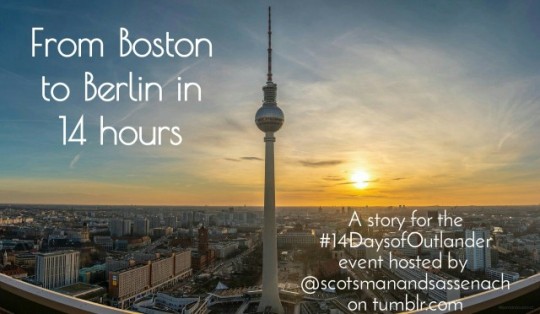
After her marriage with Frank Randall has failed and Claire Beauchamp flees from her violent husband, she finds refuge in the house of the Fraser/Murray family in Berlin-Wilhelmshorst. But then tensions arise between Britain (which has since left the EU) and some EU member states. All holders of an English passport are required to leave EU territory within six weeks … and suddenly Claire’s fate looks more uncertain than ever.
This story was written for the #14DaysofOutlander event, hosted by @scotsmanandsassenach

“Glencoe” by dowchrisr
Chapter 2: 14 Men (1)
James Alexander Malcolm MacKenzie Fraser was born and raised in the Scottish Highlands. But the development of world history made it impossible for him to spend the rest of his life in his beloved homeland.
Well-read in European history and as a keen observer of global political developments, he had guessed early on that the hard "Brexit" of Great Britain would lead the (until then) United Kingdom into an unprecedented chaos.
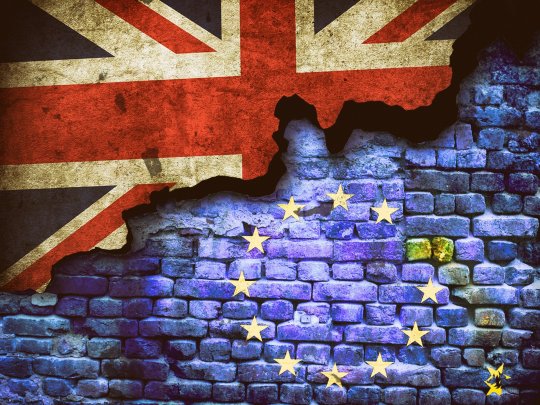
“Brexit” by Foto-Rabe
When the Corona Pandemic ebbed in Europe and the British Isles and travel restrictions were largely lifted, James Fraser, as head of his clan, decided it was high time to leave the country he and his family loved so much. Many people around him, especially the other 13 members of the "New Jacobites", felt the same way. Some of his friends emigrated to the Republic of Ireland, others to France or the Netherlands. For Jamie and his family another door had opened many years before.
Jared Fraser, one of Jamie's uncles, had gone to Paris in his youth and (starting from the French capital) had built up a flourishing, Europe-wide wine trade. He had also opened a branch in Berlin. From there the entire business for Germany and South-East Europe was coordinated. In order to save taxes and to invest the proceeds of his business profitably despite the European Central Bank's zero-interest policy at that time, Jared Fraser had bought real estate. Among the houses he had purchased in the state of Brandenburg was a well-preserved manor house just some kilometers outside of the German capital. After his death, this part of Jared's estate had fallen to Jamie and his sister Jenny.
So it came about that on the day it was decided at Westminster that the emergency laws passed because of the Corona Pandemic should remain in force, a container ship left the port of Edinburgh for the port of Rostock. The containers it was carrying contained most of the Fraser/Murray family's movable property. The family itself, Jamie, Ian, Jenny and the children, had boarded a Norwegian Airlines plane the night before, which took them to Berlin-Schönefeld Airport within four and a half hours with a stopover at Oslo-Gardermoen.
When they arrived at the airport, Felix Kloppstock, the vice manager of the Berlin headquarters, who had become a trusted employee of Jared Fraser, had picked them up in a minibus owned and used by one of the wine shops. When they arrived in Wilhelmshorst near Potsdam, the house was already prepared for them. The beds were made and the smell of roast venison came from the kitchen, letting them know that dinner was ready. They were then greeted by Mr. and Mrs. Ballin. The 55-year-old housekeeper Helene and her husband Frieder had also been hired by Jared Fraser and entrusted with the management of the house years ago.
When all the Frasers/Murrays fell into their beds late in that night, they did so with one laughing and one crying eye. Laughing because they knew they were safe now. Crying because they missed their home. And James Fraser was thinking about something else entirely. He was grateful that his parents didn’t had to witness the political developments of the present day. At the same time, he was overcome with a feeling of great sadness when he thought that he would probably not be able to visit their graves in the cemetery near Lallybroch for a very long time.

“Brandenburg” by reinhardweisener
Just a few days after their arrival at their new home at Wilhelmshorst, they were to learn from the media how right and decisive their step had been. They had put the children to bed after dinner and were now sitting together in the kitchen for a while. Jenny became as white as a sheet when the radio reported that the London government had announced that it would now explicitly use the emergency laws to take action against the Scottish independence movement, which was growing bigger and louder with every single day. Anyone suspected of being part of the "New Jacobites" or their followers should be arrested and charged with high treason. Ian, who was sitting next to Jenny at the kitchen table, looked up in horror. Jamie, who had just taken two bottles of beer from the fridge for himself and Ian, turned, looked at them and just sighed.
"This is what I've always been afraid of. But don't worry, our naturalization papers. identity cards and passports are on their way. I spoke to Ernst last night."
Ernst, more precisely Ernst Neuenburger, was Under State Secretary in the Federal Ministry of Economics. Jamie had met the official in 2018, when his uncle Jared took him to the ministry's summer party, introducing his nephew to the network he had been building across Europe for many years. (More than anybody else outside Scotland, Jared Fraser had dedicated his life with great zeal to the service of the "New Jacobites". Wherever on the continent he could, he had used his influence and financial resources to promote an independent Scotland with good relations to the EU).
James Fraser and Ernst Neuenburger were immediately sympathetic to each other. And in the course of the day, Jamie discovered that Ernst Neuenburger was not only a competent interlocutor in economic matters, but that he had also a great affection for Scotland.
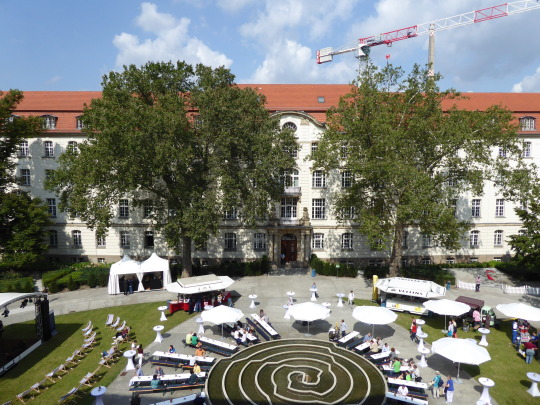
BMWi Goerckehof mit Brunnen by Fridolin freudenfett - Own work, CC BY-SA 4.0, https://commons.wikimedia.org/w/index.php?curid=62265692
"If we take the right of self-determination of peoples seriously, as laid down in Article 1(2) of the UN Charter, through the International Covenant on Civil and Political Rights and the International Covenant on Economic, Social and Cultural Rights of December 19, 1966, then Scotland must be given the right to be a State in its own right," the Under Secretary of State had said.
Jamie had nodded in agreement and then, more jokingly, asked:
"Are you secretly a Jacobite, Mr. Neuenburger?"
"No, Mr. Fraser," the politician had replied with a smile, but with a very serious undertone in his voice, "I don't think you have to belong to any special group to stand up for freedom and self-governemenrt. To be a democrat is, in my opinion, quite enough."
Neuenburger, who obviously enjoyed talking to Jared Fraser's nephew, took a quick look around.
"Why don't we take a few steps," he then said, pointing with one hand towards a path that would lead them away from the center of the festival.
"Gladly," Jamie replied, and together they moved away from the crowd. Jamie well remembered seeing his uncle Jared as he walked away, talking to a man and a woman in the shade of a high hedge, also a little away from everyone else. Jared had smiled, nodded briefly to his nephew and then immediately returned to his conversation partners.
When they had moved about two hundred yards away, it was Jamie who resumed the conversation:
"It's interesting that you say that as a German, we're only used to revolutionary sounds from French people. The French supported us in earlier centuries, but the Germans..."
"If I may say so, Mr. Fraser," Neuenburger interjected, "the Germans didn't exist then. When the French supported the Scots, thanks to the political intrigues of the French, the Austrians and the Russians, there was only a patchwork of small and tiny German countries. It was Bismarck..."
"I know, I know. But they were Germans, the King of Hanover..."
"Oh, yes, of course. And no need you remind me that the Kingdom of Prussia was allied with the Kingdom of Hanover... But you know the saying: 'You can't choose your family, but you can choose your friends'. As you may know, George August II was a cousin of Frederick William I, the father of Frederick the Great. Both George II and Frederick I were brought up by their common grandmother, the Electoress Sophie at the palace of Herrenhausen near Hanover. It has been historically recorded that the men already had an aversion to each other as children. This aversion continued later, when they became men or kings, respectively."
Neuenburger paused with his remarks when a waitress appeared with a tray of glasses filled with champagne and offered them to the two men. Both men exchanged their empty glasses for full ones and continued their walk.
"Twice it almost came to war between Hanover and Prussia. Did you know that?" asked Neuenburger.
Jamie looked at him questioningly and shook his head slightly.
"In 1731 there was a dispute between the kingdoms and the royal families because Prussia was recruiting settlers wherever possible. George II issued an edict and assembled an army on the banks of the river Elbe. Friedrich Wilhelm I, on the other hand, had 40,000 soldiers stationed at Magdeburg to defend his territory if necessary. The dukes of Brunswick and Gotha mediated and were able to settle the dispute to a certain extent. A war was prevented.
But it was a cold peace. At the same time as the Scottish resistance was crushed at Culloden, another dispute between Hanover and Prussia was smouldering. After the death of the last prince from the house of Cirksena in 1744, it was disputed who would inherit the county of East Frisia. On the part of the Frisian princes there had been a contract of inheritance with Hanover since 1691, but Frederick I had received a “Letter of Expektanz”, meaning an actual entitlement, from Emperor Leopold on 10 December 1694, which said, that after the extinction of the princely house of East Frisia the county should fall to the kingdom of Prussia. The decisive factor in this conflict, however, was the city of Emden. At that time the town was politically isolated and economically weakened. The reason for this was the “War of Appelle” fought in 1726/27.
This war was actually a civil war and resulted from a conflict between Prince Georg Albrecht of East Frisia and the East Frisian Estates. It was, how could it be otherwise, about the tax sovereignty. But even after their defeat, the city leaders did not give up their goal of making Emden an important economic metropolis again.
Since the 'Emden Revolution' in 1595 the city had the status of a quasi-autonomous urban republic. In this - successful - revolution the city had already freed itself once from the rule of the Cirksena and, as a ‘satellite’ of the Netherlands, achieved de facto the status of a free imperial city. From then on, the representatives of the city signed all contracts and public publications according to the Roman model with ‘S.P.Q.E.’ (Senate and People of Emden). The title ‘Respublica Emdana’ and the abbreviation ‘S. P. Q. E.’ were from then on officially used by the city.
Understandable that the aldermen of the town wanted to return to this freedom and independence, which they had already once enjoyed. When the last Cirksena Prince took over his reign in 1734, the city had already refused to pay homage to him. But at least from 1740 on, the Emden councillors planned to achieve their goal with the help of the Prussian King. Secretly they negotiated the ‘Emden Convention’ with the Prussians. In this treaty, Prussia recognized the rights and privileges of the city of Emden and the East Frisian estates, and in return the East Frisian estates recognized the rule of Prussia after the death of the last prince from the house of Cirksena. It was a win-win situation. Prussia left the East Frisians and their estates the liberties they had enjoyed before and in return received a land with access to the North Sea. On 25 May 1744, two weeks after the Emden Convention had been ratified by both parties, the last prince of East Frisia died. Prussia immediately asserted its right of succession. The widowed Princess of East Frisia, a relative of Friedrich II, recognised the succession of Prussia on May 26th and recommended herself ‘to the protection and generosity of the King’. Frederick II had immediately instructed his representatives to make it known everywhere that the privileges and rights of the East Frisians would remain undiminished and that no enticement of East Frisian citizens was to be feared. With this reassuring message, the Prussian soldiers in Aurich and Leer were even positively received. The seizure of possession was already completed on June 2, just one week after the death of the Prince. Three weeks later, on June 23, 1744, the entire county paid homage to the Prussian Crown.

“Rathaus Emden” by fokkengerhard
What do you think, Fraser? Did they rejoice at it in Hanover, or better, in London? I don't think so. On June 3, the Hanoverian official Voigt arrived in East Frisia with papers demanding the rights of the Hanoverians. But there the whole thing was already finished. The speed with which the takeover of East Frisia took place, made possible by the careful and secret preparation, once again put the Hanoverian competitor in the shade. One cannot avoid the impression of dilettantism on the part of Hanover. It is true that they had also reacted immediately there by sending Voigt to East Frisia on June 3, with a corresponding power of attorney, but nobody wanted to accept him or his claims officially. On June 10, the Estates very aptly informed him that the contract which had been concluded between the House of Cirksena and the House of Hanover was neither known to them nor did it concern them, since neither they nor the Emperor had approved the document. East Frisia was also supposed to have a potential for conflict for some time to come. In 1748 the disputes over maritime trade became more intense, especially with the Netherlands, but also with England and Sweden. During the Seven Years' War, however, England then needed the support of Prussian soldiers and only in the course of this did it give up all claims in relation to East Frisia."
The two men had stopped and emptied their glasses.
"Why are you telling me all of this?"

“Brunnen im Kanonenhof des Invalidenhauses, heute Bundesministerium für Wirtschaft, Berlin” by Dirk Sattler - Own work, CC BY-SA 4.0, https://commons.wikimedia.org/w/index.php?curid=62311136
"Well, you said it was unusual to hear 'revolutionary' sounds from a German. Surely, as Frederick Engels once said, ‘revolutions in Prussia are made from above’. We may not be as revolutionary as the French, but please remember that we are a very, very freedom-loving people. The history of the First and Second World Wars is well known. However, the history of the our war of libration, 1813 to 1815, against Napoleon is often overlooked. The support from the people was so great that some historians even speak of the Prussian People's War. Men and women exchanged their golden wedding rings for iron rings to support their country. The phrase ‘gold I gave for iron’ became something like a proverb. A well-known picture, which spread after the wars of liberation, shows a returning soldier. He does not call out to his wife, who welcomes him with open arms, ‘I am back’ but ‘The fatherland is free! Victoria!' And it wasn't just then. Remember that this country has been struggling for 40 years to be reunited and thus to be free. Not aggressively, but with endurance. And when the Germans in the East brought down the SED regime, it was a peaceful revolution that brought the dictatorship to its knees. What do you think, Fraser, the people here would feel for a people that is oppressed by its, shall we say, bigger neighbour?"
Neuenburger slowly began to walk again. Jamie latched on.
"Why exactly are you telling me all of this?" he asked.
"Well, perhaps I wanted to remind you that revolutionary, i.e. cataclysmic, thoughts don't always have to unload themselves in a storm of the Bastille. Sometimes it is wiser to keep them to yourself and ... say, wait for the ratification of an Emden Convention. As far as I know, a freedom-loving people will always welcome and ... support the freedom, or rather the liberation, of another people.”
Neuenburger smiled. Jamie shook his head slightly and smiled too.
"Come Fraser," the newfound friend then said, "let's go. The buffet is open."
The conversation between the two men was not without consequences. Twice, once in autumn 2018 and once in summer 2019, Ernst Neuenburger had visited the Frasers' home estate in the Scottish Highlands as a holiday guest, before political events made these trips impossible for him. But the two men's confidence in each other had grown during these weeks of walking, horseback riding and hunting together, to the point that by the end of 2020 Jamie was able to make contact with his friend in Berlin unnoticed (through previously agreed 'private' channels). Everything that happened then, that had to happen to bring the Fraser/Murray family into safe exile, happened very quickly. It had to happen very quickly because the window of opportunity to do so was, as in any historical moment, only open for a very short time.

“Schottland” by Emphyrio
On the first Saturday evening that the Frasers/Murrays spent in their new home, Ernst Neuenburger came by to deliver the passports, identity cards and naturalisation papers for all family members. Jenny invited him for dinner and afterwards Jamie and the guest went to the library to talk in private.
After the two men had discussed the political situation in Europe for a while over a glass of whisky in front of the fireplace, Ernst Neubauer leaned over to his host..
"We have a question for you..."
It had been clear to James Fraser that sooner or later Neuburger would approach him with a request. He didn't see it as extortion or payment. On the contrary, he was grateful if he could do something in return for the privileges granted. He would have been reluctant to remain a debtor to his friend.
"You must believe me when I tell you I didn't plan this. I have and will continue to do everything I can to help you and your family with great joy ..."
"Speak Ernst, straight forward."
"Well, you have some skills that would be very useful to us. You speak English, perfect French, very good German. You are intelligent and a man who can keep quiet. You also have a thriving wine trade and as a businessman..."
"... I can travel anywhere without raising suspicion?”
"Right. But the most important thing is that I trust you."
The men were silent for a moment.
"Would you be willing," Neuenburger then asked, "to act as an negotiator on our behalf and travel when necessary?"
"Shall I conclude ‘Emden conventions’ for the country?"
"Maybe."
Neuenburger had to smile. What a good memory Fraser owned!
"And where would that lead me to?"
"Well, first of all, to the African continent. 116 million Africans in 31 countries speak French. And counting. Your language skills predestine you for tasks in this field. However, we would ask you to learn Spanish and possibly Portuguese as well. Then we could also send you to South America. Of course, we will provide you with a language teacher paid by us."
Again the men were silent for a moment.
"How dangerous could these 'missions' be for me?" Jamie then asked.
"Not particularly," replied Neuenburger. "You are travelling as a businessman and that causes far less sensation than the travels of a politician or a political official. There are quite a number of, shall we say, colleagues of yours who do that for us. So far, every one of them has returned. We will, of course, prepare you thoroughly for your task."
Jamie pondered for a moment, then nodded and answered:
"Travailler pour le roi de Prusse? Jes suis prest! This country has provided me and my family with freedom and a new start here. If we were not here, I would probably be in an English prison by now. It's only fair that I give something back.”
"Thanks," said Neuenburger and went on “It’s not the King of Prussia, but a democratic republic you serve. Just saying.”
Then he reached into the right inside pocket of his jacket and took out a fresh passport, which he handed to Jamie.
Jamie reached for it and opened the little red book.
"Well, well, well, you've thought up a nice alias for me."
Neuenburger smiled.

“Reisepass” by Edeltravel_
Four weeks later, Etienne Marcel de Provac Alexandre, alias James Fraser, began his first trip as a well-camouflaged diplomatic negotiator.
This and other journeys were to take him first to numerous states on the African continent. He negotiated political and economic contracts with other negotiators, lobbied for the release and repatriation of citizens in difficulty and delivered oral messages whose content was too secret to be transmitted by paper or electronic means. From 2023 on, when he became fluent in Spanish, he was also send to South America. One of his last trips took him to Buenos Aires, where he signed a trade agreement. Officially, however, he attended the "Conference of Argentine and Chilean Wine Merchants". In order to make his trip as unobtrusive as possible, he did not fly back to Berlin directly, but made a stopover in Boston. There, officially, he would meet a businessman, a friend, who was planning to include the wines which Etienne Marcel de Provac Alexandre sold, in his range. But in reality, this stopover was to change his life fundamentally. But James Fraser knew nothing of this when his plane landed at Logan International Airport.
#14DaysofOutlander#Outlander#Outlander Fan Fiction#From Boston to Berlin in 14 hours#Claire Beauchamp#Jamie Fraser#Ian Murray#Jenny Murray#Scotland#Germany#Boston#Berlin#Etienne Marcel de Provac Alexandre
49 notes
·
View notes